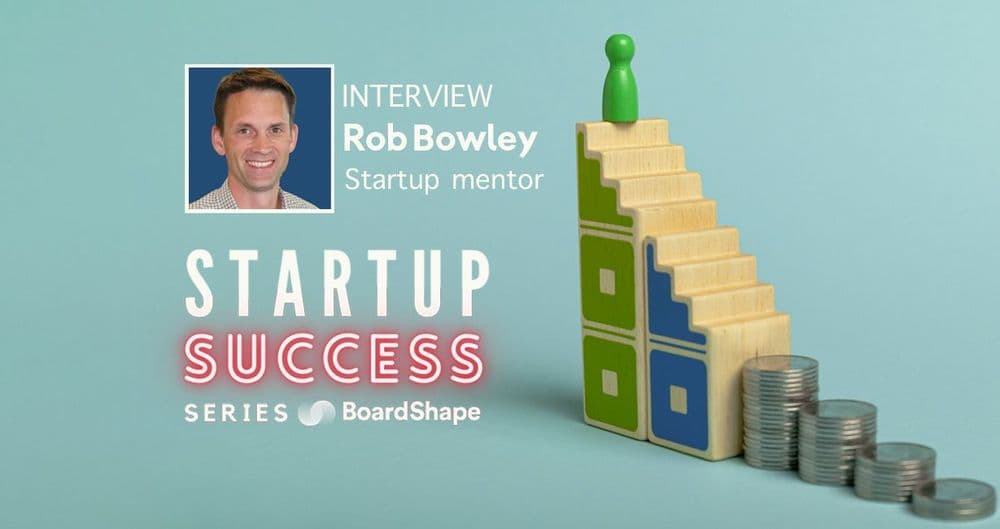Welcome back to Startup Success, where we uncover the keys to thriving in the challenging yet rewarding world of entrepreneurship. In this edition, we're excited to bring you a conversation with Startup mentor Rob Bowley whose two decades in the tech arena have been marked by a strong commitment to guiding startups through their formative stages.
Our discussion with Rob takes a deep dive into the heart of startup challenges, particularly the tech-related hurdles that can make or break a young company. He brings a fresh perspective on how to navigate these obstacles, sharing wisdom gathered from a career rich in experiences with both established brands and emerging ventures.
Join us for an engaging conversation with Rob as he unpacks the essentials of startup strategy, from understanding the importance of a lean approach to technology to mastering the art of timely decision-making. Learn how to navigate startup challenges effectively and see how innovative thinking can transform technological hurdles into opportunities for growth and innovation.
Rob Bowley
Rob brings over 20 years of tech industry experience, including a decade in senior leadership roles, to the forefront of startup mentoring. His career spans a broad spectrum, from leading technology teams at major brands like Co-op and Moneysupermarket, to nurturing the growth of startups and scale-ups such as Masabi & 7digital. Rob's expertise lies in product and technology strategy, where he has led teams ranging from a few individuals to over a hundred engineers. He is a pioneer in implementing Agile methodologies and is the creator of the Agile Retrospective Resource Wiki a globally utilized tool. Rob is deeply involved in the Manchester tech community, serving as a mentor for startup accelerators, a board advisor for the Manchester Tech Festival and a member of the Manchester City Council Digital Strategy Advisory Board. He's a passionate advocate for diversifying the tech industry and creating inclusive career pathways.
We sincerely appreciate Rob's willingness to share his expertise and insights, offering invaluable guidance for navigating the startup landscape.
What are the typical early challenges for startups, and what strategies do you recommend to overcome them?
My focus is product and technology. The most common problems I see are building too soon, building too much, building it wrong, being beholden to a technology partner and having to start again.
Do you really need to build something yet? Have you clearly defined what your proposition is? Who are your users, and what problems will you solve for them? What unique value are you offering, and importantly, will people pay for it? The key here is not to jump in and build things too quickly. Somewhat ironically as a technologist, I spend a lot of my time advising people not to build things… yet.
It's important to do as much research and testing as possible to validate your proposition before building something, such as user interviews, online surveys, lightweight prototypes. define a clear Minimum Viable Product (MVP) and focus on the absolute minimum (don’t build too much), get it in front of users as soon as possible. Even then you still may not need to build something - the “No-code” ecosystem is full of platforms you can use to build a first iteration of your product quickly and cheaply without much technical knowledge.
If, and when, you’ve proved you need to build something for real - unless it’s something you’re already experienced with - get some independent professional advice. I have at least one conversation a month with founders who’ve had painful and often, sadly, business-ending experiences working with agencies and partners (building it wrong and becoming beholden to a technology partner). It’s not always the partners’ fault. The challenge is, you’re not an experienced engineer, you’re not familiar with what to ask for or how to best engage.

A large percentage of startups fail because they run out of money. Can you give any advice to help founders to stay afloat?
Ruthless prioritisation and focus. Initially, by focusing on the absolute minimum MVP, you’re less likely to waste time and money. Then, try to stay lean for as long as possible. Often startups run out of money because they’re just trying to run too fast. Some of the biggest tech “unicorns” took many years before they hit their inflection point. Also, use your network to get good commercial and financial advice.
What are the most effective ways for founders to validate their product or service in the market to ensure it meets a real need
Again, do as much as possible before building something! Further on from that, making sure you have clear KPIs and the ability to measure them and the ability to run fast-paced experiments to refine your Product Market Fit (PMF). The ability to do so is what I’m referring to with “building it wrong” - having spent a load of money building your product, but not having the ability to easily make changes to it - especially lacking things like automation for testing & deployment.

Can you give any other examples of key decisions that significantly affect a startup's direction, along with your advice on how founders should handle them?
Hiring is a key one as people tend to be the most significant outlay. Don't hire too soon - founders should be close to everything, especially in the early stages. If you do need to hire, I can’t emphasise enough the importance of an effective and rigorous recruitment process. Hiring the wrong people is incredibly costly.
How can founders make the most of their relationship with mentors to gain strategic insights, access to networks, and specialized knowledge?
Founders are often very confident and the first obstacle is being aware and willing to get support. With business areas that are new to you as a founder it’s a case of "you don't know what you don't know", until it’s too late. These are often common, solved and avoidable problems.
It's important to have an open mind and get a broad network of mentors, even in areas you think you might be confident in.

Once again a massive thanks to Rob for sharing his invaluable insights!
Introducing Boardshape
Discover how Boardshape can enhance your online meetings. Our board management solution empowers you to:
- Collaboratively create meeting agendas.
- Delegate agenda items to team members.
- Centralize all meeting materials.
- Facilitate decision-making with live polls.
- Effortlessly track follow-up discussions using dedicated comment sections.
Our presentation mode means seamless synchronization during meetings, ensuring everyone has the right documents readily available at the appropriate time.

